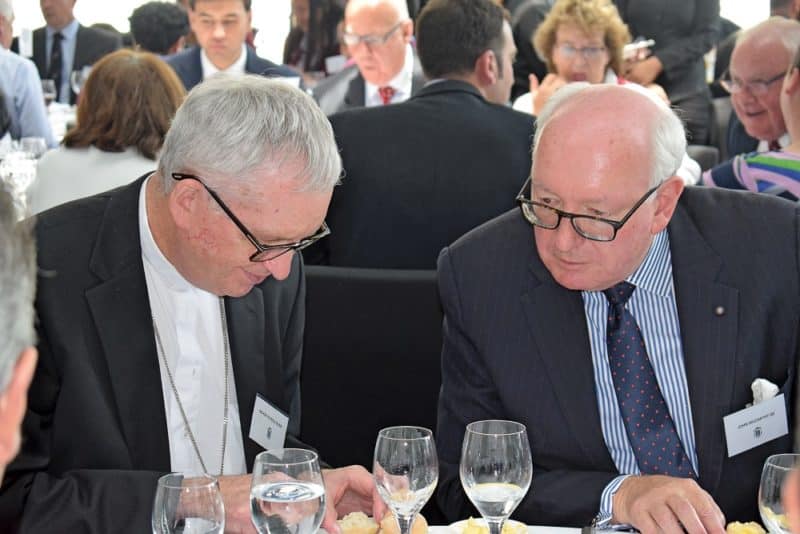Former Australian Ambassador to the Holy See John McCarthy, QC, has called on New Zealand Catholics to help eradicate modern slavery by making sure the Government, the private sector as well as the Church and her agencies stop supporting goods and services tainted with slavery and forced labour.
In his speech at the first Bishop’s Lunch in Auckland diocese, hosted by Bishop Patrick Dunn, Mr McCarthy said more than 40 million men, women and children around the world are trapped in modern forms of slavery. The event was held at the Northern Club in Auckland on December 2, the International Day for the Abolition of Slavery.
“I’m looking for the heroes in New Zealand. I want to see if the Church can start leading the way… (slavery) is one of the great crimes of our times and we’ll get rid of it in our generation,” he said.
Mr McCarthy is currently chair of the Anti-Slavery Task Force of the Archdiocese of Sydney and a founder and co-chair of the G20 Interfaith Forum Anti-Slavery, Human Trafficking and Forced Labour Taskforce 2018.
He stressed this issue is very close to the heart of Pope Francis. In fact, he added, the document on Sustainable Development Goals, adopted by the UN in September, 2015, which includes goals to eradicate modern slavery and human trafficking, was signed in the presence of the Holy Father. Both New Zealand and Australia are signatories to the SDG.
“Modern slavery (and forced labour) is a US$180 billion per annum industry, according to the ILO and over 40 million men, women and children are shackled in this dreadful condition,” he said.
“That money and the virtual impunity of their actions must be stripped from . . . these exploiters. This is the cry for freedom of our generation, the people’s cry for freedom which we must answer,” he said.
Law
Mr McCarthy said a recent law passed in Australia could give New Zealanders the chance to press their (New Zealand) Government to stop procuring slavery-tainted goods and services.
Last year, he said, the Australian Parliament passed the Modern Slavery Act, which will require big corporations to report the exposure of their goods or services to slavery as well as the exposure of their supply chains. This Act covers 500 New Zealand corporations doing business in Australia.
“Corporate Australia said to its government, ‘no, we are not doing it without you’,” Mr McCarthy said.
This stand, supported by the Catholic Church in Australia, pressured the Australian government to look into its own procurement and supply procedures as well.
“I would have thought corporate New Zealand would say the same message to the (NZ) Government,” he said.
He said the New Zealand Government is currently considering a national action plan against slavery and trafficking as well as a supplier code of conduct for public procurement.
“I am here to submit that your Parliament should act on this next year. They’ll only do something as a result of more representations . . . from New Zealanders,” he said.
He said he would like to see both countries adopt a joint approach to corporate and government procurement. A joint understanding would put both countries in a better situation in terms of monitoring and testing various firms.
Together, he said, both countries can show the world how to “slavery-proof” their supply chains.
In an interview with NZ Catholic, Mr McCarthy said that, at present, there is no penalty for corporations who would not register under the Modern Slavery Act.
“But I am sure the Australian media will pick up who did and who didn’t. This bravado (not registering) may result in the wrong market exposure. It can cause them harm in terms of their reputation,” he said.
Survey
Mr McCarthy noted one survey showed, in New Zealand, 83 per cent of consumers would not buy an item if they know it is tainted with slavery.
He said a $5 dollar t-shirt would have a trail of misery behind it. “How were they able to do that otherwise?” he asked.
He said a lot of New Zealanders, even if they did not have a lot of money, would choose not to buy that shirt.
Mr McCarthy said our own Catholic social teachings tell us “we don’t exploit people and we don’t support companies and firms whose goods are tainted”.
Mr McCarthy laid out his message to the people in the pews.
“I want them to believe that it is important to eradicate slavery, believe that real human beings are being deprived of their freedom, that these are weak and vulnerable people, often the poorest of the poor and that without assistance can never get free,” he said.
To Church leaders, Mr McCarthy asked three things.
“I would like to see that slavery is included as a part of the evangelisation curriculum in Catholic schools, in catechetics,” he said.
“Secondly, I would like to see a regular featuring of important days on which they speak about slavery like St [Josephine] Bakhita’s day (February 8), the World Anti-Slavery Day(s) (July 31 and December 2). Thirdly, I would like to see Church agencies trace their own supply chains and try to eradicate modern slavery and human trafficking from them.”
Mr McCarthy was Australia’s ambassador to the Holy See from 2012 to 2016.

Reader Interactions